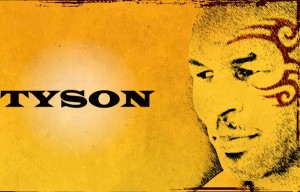TYSON: 4 ½ STARS
 When Mike Tyson saw Tyson, the new documentary about his life, he said, “it’s like a Greek tragedy, only I’m the subject.” The movie, directed by his good friend of twenty years James Toback, is an unvarnished look at the life and hard times of Iron Mike, told by Mr. Tyson himself.
When Mike Tyson saw Tyson, the new documentary about his life, he said, “it’s like a Greek tragedy, only I’m the subject.” The movie, directed by his good friend of twenty years James Toback, is an unvarnished look at the life and hard times of Iron Mike, told by Mr. Tyson himself.
For ninety minutes in his own words Tyson talks about the events that shaped him. How he was bullied as a child, turned to crime and how his life was literally saved by a tough old fight trainer named Cus D’Amato. He has harsh words for his former business partner Don King, who he calls a “wretched reptilian &*$%#@(!*%$#” and even harsher words for the woman he was accused of raping. It is a no-holds barred look at a troubled life lived very much on the world stage.
The thing that makes Tyson such a fascinating document is its complete lack of objectivity. Calling it a documentary implies a lack of bias, so let’s call it a portrait. A self portrait brought to life by a gifted filmmaker who turned on the camera, asked the right questions and got out of the way. The result is riveting.
Whether or not you are a boxing fan the movie is an unforgettable peek into the psyche of one of the most famous men of the 20th century. As the camera focuses tightly on his battered, tattooed face he speaks in a colorful stream of consciousness veering from tender to funny to sad to menacing often in the same sentence. I’m still not sure I want to hang out with Mike, but after listening to him and watching home video of him paying with his three-year-old daughter, I feel like I kinda-sorta understand more about the complicated individual that is the real Mike Tyson and not simply the media construction of him.
It’s a humanizing portrait of a man whose greatest sporting achievements have been overshadowed by the relentless coverage of the more tabloid aspects of his life: the ear biting, the stint in jail for raping beauty contestant Desiree Washington and the fortune, estimated at more than $300 million, that he won and lost. He’s clearly had a great deal of therapy but, at age forty, he seems to have reached an uneasy peace with himself. He calls himself an extremist, only able to live on the high and low ends of life. The middle has no interest for him, he says. Learning that is perhaps the thing that has enabled to him to understand himself, and in turn help us, through this film, understand him a little better.
